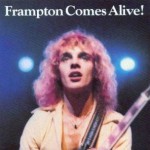Honestly, I was gonna leave it alone. I even deleted the draft I started earlier last week. But then the local fair, trying to recover from an embezzlement scandal, indicated one step toward restoring its credibility is the music acts it announced for this year, a roster that includes Alice Cooper and Peter Frampton. Listen, I was amidst their prime audience growing up and even I don’t want to go.
 But that truly isn’t the main focus of this rant. I did indicate at the outset of this series that it would include things that set me off. And Frampton Comes Alive! is one of those things. That album became the number one selling LP in America on April 10, 1976. And even though acts like the Eagles, Led Zeppelin, Wings and the Rolling Stones would temporarily displace it, the album would log another nine weeks at the top of the charts in the ensuing six months.
But that truly isn’t the main focus of this rant. I did indicate at the outset of this series that it would include things that set me off. And Frampton Comes Alive! is one of those things. That album became the number one selling LP in America on April 10, 1976. And even though acts like the Eagles, Led Zeppelin, Wings and the Rolling Stones would temporarily displace it, the album would log another nine weeks at the top of the charts in the ensuing six months.
I’m sorry. I just don’t get it. Do yourself a favor. Find a copy of Humble Pie’s Performance: Rockin’ the Fillmore, the 1971 recording made while Frampton was still in the band. Compare the 14 minutes on side four of that LP — “Hallelujah, I Love Her So” and “I Don’t Need No Doctor” — to the 14 minutes of bloat on side four of the Frampton album called “Do You Feel Like We Do?”. Just because Frampton’s tune was a monster hit doesn’t mean it holds a candle next to what Frampton and Humble Pie were doing. Performance resounds with emotion. Frampton Comes Alive is coated in a sheen of pop sweetness. What the monster hit has going for it is a gimmick — the so-called “talkbox” that allowed Frampton to make his guitar “talk.”
Now others used the talkbox before Frampton: Joe Walsh on “Rocky Mountain Way” in 1973 and Aerosmith on “Sweet Emotion” in 1975, to name just two. But, for whatever reason, people were enthralled by Frampton’s use of it. The audience went wild (although there is some suggestion that some of the enthusiastic audience response on the LP is “canned”). Yet as overblown and overlong as “Do You Feel Like We Do?” is, it isn’t the only tune that leads me to immediately reach for the “off” button on any device from which it emanates. “Show Me The Way,” which also features the talkbox, and “Baby, I Love Your Way” are pieces seemingly tailored for and aimed at a largely female audience looking for the latest pop idol. Do you really think the album cover was aimed at any other audience either?
Sadly, “Baby, I Love Your Way” is the best of the acoustic set of love songs on the album. The competition, though, is plenty weak, what with lyrics like “I don’t care if they cut my hair/All I wanna be is by your side” from “All I Want to Be (Is by Your Side)”. Yet the electric sets are equally weak. While Frampton is a skilled guitarist, whatever hard rock chops he displayed in Humble Pie rarely appear on Frampton Comes Alive. When Frampton wants to get “funky,” the band plays “Doobie Wah,” which sounds like it belongs on a Doobie Brothers album. Now there’s nothing wrong with the Doobies but funky they aren’t. The closest this LP ever comes to reflecting Frampton’s roots is with “(I’ll Give You) Money.” Even the cover of “Jumpin’ Jack Flash” is pitiful.
Sure, the album sold a bazillion copies and you couldn’t escape it in 1976. But as one website devoted to classic rock bands noted with a perhaps unintended but clear understatement, “Quite why the record was so successful has perplexed many rock critics.” Me? I’d call it one of the most overrated albums of all time.
You know that I live a lie
Take me away, take me away, faking my way through
“Wind of Change,” Peter Frampton, Frampton Comes Alive!








I’d take Franklin Comes Alive over this any day.
https://www.flickr.com/photos/slipperyp/292694713/
Undoubtedly, sales were severely affected by the fact Franklin’s hair isn’t as purty as Frampton’s.